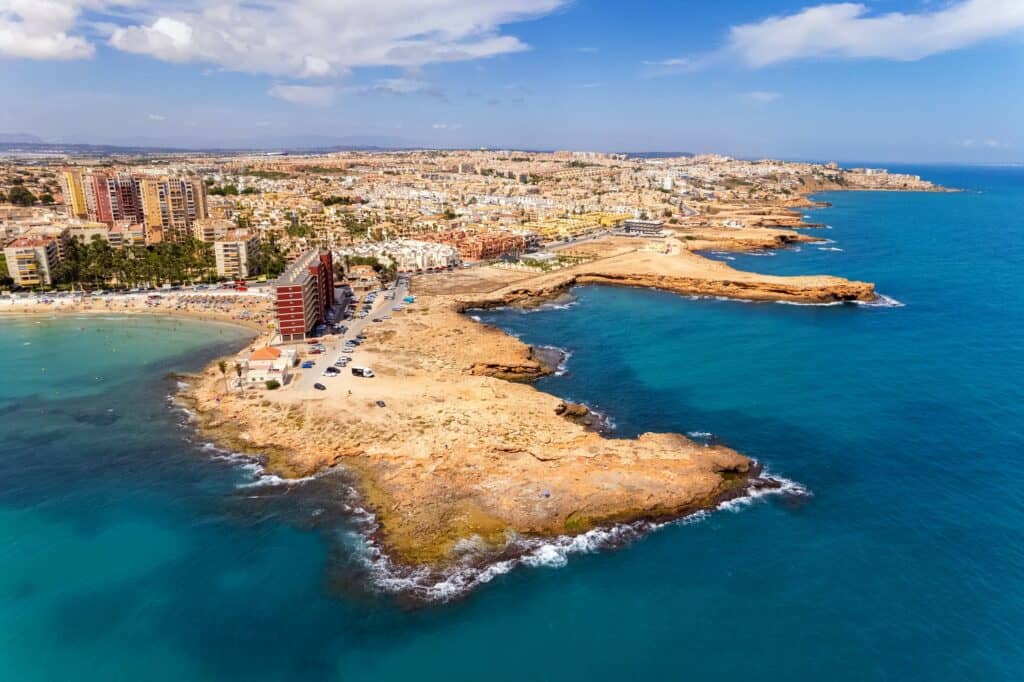Introduction – What is Non Resident Tax?
When buying property in Spain it is important to understand the different taxes you must pay to avoid complications and possible penalties or fines. One tax which must be paid as a non resident is Spanish non resident tax.
It is common to make the assumption that if you do not live in Spain or do not have an income in Spain then you do not have to pay taxes. This is not the case.
If you own a Spanish property as a non resident you must pay non resident taxes whether you rent out the property or not. If you do not rent out the property then the tax you pay will be based on the imputed (fictitious) income of the property. Don’t worry, we will go into this in more detail below!
A non resident tax return must be completed by each individual appearing on the Deeds to the property. This is the case whether it is multiple individuals or a married couple.
Spanish property taxes for non residents can be confusing and it is therefore strongly recommended that you instruct a Lawyer to file this tax on your behalf. It can be a complicated process and it is extremely important that it is completed correctly. In the event of negligence or malpractice a Lawyer will be covered by indemnity insurance.
Below you will find information about what makes you a Spanish resident, how Spanish property taxes for non residents work, how much you can expect to pay and more.
When reading this or any other document about Spanish non resident tax please bear in mind that Spanish non resident tax rates as well as others may change so please do always check this.
We hope we have covered everything in this article, but should you have any additional questions, Movehappy are always here to help.
What Makes You a Resident or Non Resident in Spain?
Before going into detail about Spanish non resident tax, you may be unsure whether you are/will be classed as a Spanish resident or not.
You are classified by the Spanish tax authorities as a non-resident if you spend less than 183 days in Spain in a year. This does not have to be in one visit and can be spread across the year. If you spend more than 183 days in Spain then you are officially classified as a Spanish resident and are therefore fully taxable. You will need to apply for a Spanish long stay visa.
You will also be classified as a Spanish resident if your centre of financial income or interests is in Spain or your spouse and/or underage children are Spanish residents.
If you are classed as a non resident and own a property in Spain, you will be required to submit a non resident tax return and pay Spanish property taxes including non residents tax. As we mentioned previously, this is the case whether you are making money from renting the property out or not.
Please note, these rules are likely to change due to Brexit and you can read more about this by clicking the link.

Spanish Rental Tax for Non Residents
If you are a non resident and rent out a property in Spain you must pay rental tax on this income.
Non resident tax rates differ depending on where you live. The general flat income tax rate is 24% for non residents. However, if you are an EU resident or a resident of an EEA state then you will pay a lower rate of 19%.
As an EU resident or a resident of an EEA state you can also deduct any expenses such as house insurance, community fees, property repairs costs etc. If you are not then you must pay tax on the full amount of the rental income.
Please note that the amount of tax you pay is dependent on where you live, not your nationality. If you are for example a British national living in a country outside of the EU, Iceland and Norway then you will be required to pay the higher tax rate of 24%.
To see how much rental tax equates to, let’s now use the example of a property making a rental income of €500 per calendar month.
An EU resident or a resident of an EEA state will pay 19% of this is rental tax which comes to €95 per calendar month, a total of €1,140 per year. As stated above, you are able to deduct any expenses. A lawyer or other expert would be able to best advise you what you are able to claim as an expense.
In comparison a non EU or EEA state resident will pay 24%. This equates to €120 per calendar month, a total of €1,440 per year.
Non resident rental tax is calculated quarterly on the 20th of April, July, October and January. You must complete a tax return for each quarter. So, any rental income received from January to March should be declared by April 20th. Any rental income received from April to June should be declared by July 20th and so on.
If you intend to rent the property out for part of the year only, then you will have to pay rental tax for this period of time and imputed income tax for the remainder of the year. Please see below to find out more about imputed income tax.
Imputed Income Tax for Non Residents
As discussed above, if you own a property in Spain and are classed as a non resident you must pay Spanish non resident tax whether you rent out the property or not. If you do not make a rental income on your property then the cadastral property value will be used to calculate an imputed income.
The cadastral property value refers to an estimated value given to all properties in Spain. The cadastral value of Spanish properties can be found on documents such as its IBI/council tax paperwork. The cadastral value is usually much less than the market value of the property.
The cadastral value is then used to calculate an imputed income. This is a ‘fictitious’ income. It may be easier to view this as an estimated rental value.
The imputed income is 1.1% of the cadastral property value if this was revised after 1st January 1994 (else it will be 2%). After working out 1.1% of the cadastral value you will then pay tax on this amount.
As with rental tax the tax rate you pay will depend on where you live. The general flat income tax rate is 24% for non residents. However, if you are an EU resident or a resident of an EEA state then you will pay a lower rate of 19%.
Please note that as with Spanish rental tax, the tax rate you are required to pay is dependent on where you live rather than your nationality. Using the same example, if you are a British national living outside of the EU, Iceland and Norway then you will have to pay the higher tax rate of 24%.
To see how much imputed income tax equates to, let’s now use the example of a property with a cadastral value of €100,000. 1.1% of €100,000 is €1,100. You will therefore pay tax on €1,100 per year.
An EU resident or a resident of an EEA state will pay a tax rate of 19% of the calculated €1,100. This equates to €209 per year.
In comparison a non EU or EEA state resident will pay 24%. This equates to €264 per year.
To be compliant, you must make a tax declaration as a non resident before 31st December each year.
How to Pay Non Resident Tax in Spain
Above we have been through what taxes you must pay as a non resident property owner in Spain. Now we will outline exactly how you go about doing this.
You will need to fill out Spanish non resident tax form 210 or ‘form Modelo 210’. You will use the same form whether you are renting your property out for an income or paying tax based on the imputed income.
As discussed above, non resident rental tax is calculated quarterly on the 20th of April, July, October and January. You must therefore complete a tax return using form 210 for each quarter.
If you are paying tax on the imputed income then you must make a tax declaration as a non resident using form 210 before 31st December each year.
Each owner must complete form 210 for themselves, even if the property is owned by a married couple.
Form 210 will require all of your personal details to include:
- Standard personal details including your name, date of birth and place of birth
- Your Spanish NIE number – (this is your Spanish tax identification number
- Your bank details)
- The address of the property you own in Spain and the date of purchase
- Your home address in your country of residence
- The cadastral value of your Spanish property – (this can be found on documents such as its IBI / council tax paperwork)
- Other additional information relating to the above income
Remember, Things can Change
We mentioned in the introduction how it is important to double check tax rates as it is always possible that things could change.
In particular, Brexit has led to uncertainties regarding the legal status of British UK nationals moving forward with regards to taxes and residency status. In the coming years it will be even more important for British people to ensure they know where they stand and what they must pay.
You can look online and find literature about this such as this article; BREXIT: The money matters Brits in Spain need to consider. However, Spanish Lawyers will of course keep upto date with all such uncertainties and will therefore ensure you remain compliant and most importantly legal through any changes which may occur. This will be the case with changes relating to Brexit and other changes which may occur.
What Happens if I Don’t Pay my Non Residents Tax?
It is a legal requirement in Spain to pay non residents tax as outlined above. The Spanish Government does not tend to send out reminder letters but you may see campaigns and news articles in newspapers and online such as this Non Resident Income Tax article which appeared in Euro Weekly. It is your responsibility as the property owner to remember to fill out your Spanish non resident tax form 210 correctly and on time. If you do not then the debt will accrue against the property.
First of all it is possible that interest will be added to this debt as well as additional fines. It is also possible that the bank may secure the debt against your property until they are able to pass it on to somebody else or sell it.
The tax authorities in Spain may even decide to check for evidence of fraudulent activity and therefore investigate you and the property further. This could lead to the same authorities freezing your bank accounts while an investigation takes place. This may sound extreme but it has been known to happen as the Spanish Government strives to meet tough financial targets.
When you come to sell your Spanish property at some point in the future, records will automatically reveal the debt which is attached to the property. The debt must be cleared to include any interest before the names on the official property deeds can be changed. This could significantly delay the sale. This is never a good situation to be in when you have a buyer waiting to purchase the property.
When selling any Spanish property, 3% of the sales value is automatically withheld from you by the Spanish tax authorities. You will likely be due a substantial refund from this if the capital gains tax due comes to less than this amount. To claim your refund the authorities will review the full tax history of the property you have sold. If they find there are tax returns missing, this is likely to cause long delays and could even result in further fines.
To ensure you do not miss any deadlines and that your tax return is completed correctly it is recommended that you seek professional assistance. In the event of negligence or malpractice a Lawyer will be covered by indemnity insurance.











